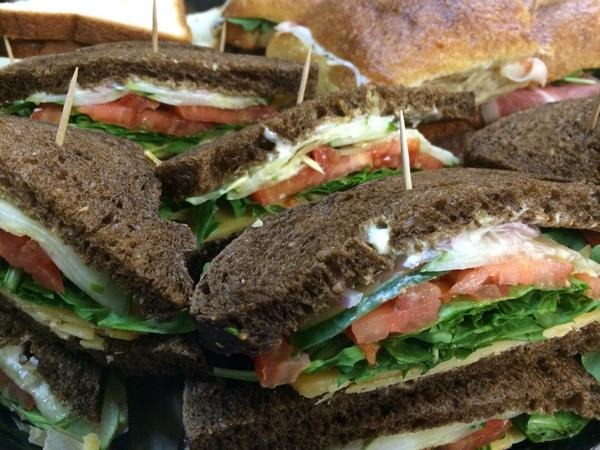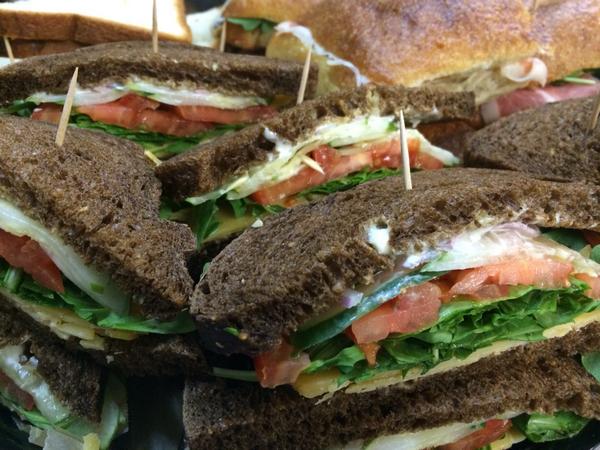Union Kitchen Serves As D.C.'s Food Incubator
The food scene in Washington, D.C., is following the national farm-to-table trend and is bursting with restaurants featuring locally sourced produce, meats, cheeses, breads and other consumable goods. However, restaurants are only one part of the thriving local food economy. D.C. is also home to many non-brick-and-mortar food companies, including catering services, food trucks, bakeries, and food product development businesses that are trying to make a name for themselves in a competitive market. Union Kitchen aims to help them thrive. This local food incubator gives these companies a support system.
Housed in a former warehouse just south of Union Market, Union Kitchen helps small businesses stay out of debt by providing them with a place for production, marketing, distribution, and everything in between — this mitigates many of the big risks of opening a business on their own. It's only been open for about 18 months and already hosts almost 50 residents and even has a waiting list. Potential members can visit Union Kitchen's website http://unionkitchendc.com/ and apply to become a resident. Members produce many unique items in the community kitchens, but one unifying factor is the ability for entrepreneurs to interact with one another, share shoulders to cry on, and slap some mean high fives.
The following five companies are all trying to find a home in D.C.'s food scene.
PraVAha•Vita (www.pravahavita.com) produces a training bar, similar to Clif Bars, for athletes. This company's products are made without preservatives, syrups, soy protein isolate crisps, or ingredients that start with "X" or end with numbers. Kathleen Hodge and her partner, Daniel Metcalf, originally began producing bars loaded with almond butter, chia seeds, banana, coconut, and chocolate, and handed them out to friends and fellow athletes but soon realized the potential market for their product. You can find PraVAha•Vita bars in many local food shops or order directly online, with free drop-off in D.C.
Broodjes and Bier A semester abroad in Amsterdam showed Sarah Frimpong, co-owner of Broodjes and Bier,. Drawing on Dutch flavor combinations, and focusing on fresh, locally sourced ingredients, Frimpong and team began working originally with the Silver Spork — an Eastern Marketplace-based restaurant and market — and are now regular residents at Union Kitchen. Mouthwatering selections include the Classic, with 18-month aged Gouda, cucumber, tomato, red onion, mayo, Dijon and arugula; and the Vondel Park, with prosciutto, aged goat gouda, fig jam, balsamic reduction and arugula. These sandwiches are available in a few select food shops, so check the company's website to see where to find them.
Udderly Nuts produces small-batch almond milk, rendered safe in a unique fashion — under pressure. And no, Bowie, that doesn't mean in a high-stress environment .The almonds are carefully ground up and mixed with filtered water, then instead of using heat, they use pressure to ensure product safety, in a process called high-pressure pascalization. This process also retains the flavor of almonds more efficiently, too. Co-owners Nick Litz, Nick Dober, Ryan Keating, and Sam Hakimi have been in Union Kitchen for about three months and produce a beverage chock-full of the goodness of almonds. And what's more, it's an all-natural and preservative-free product, offering five times more protein than traditional almond milk. Udderly Nuts Almond Milk is found in many local food stores (such as Yes! Markets and Glen's Garden Market), and is available in "Original" and "Hint of Honey."
Three ANOA , an Indonesian sambal company, also calls Union Kitchen home. Sambal is a sauce, typically made from chilies and other seasoning ingredients, such as garlic, ginger, shallots, fish paste, or shrimp. The richly flavorful ingredients are combined with other uniquely Indonesian flavors (such as young green mangoes, or green tomatoes) creating a sauce palette that can be used as a marinade, cooking sauce or finishing sauce or for anything that your heart desires — with a chili-packed kick. Partners Agus Wong and Anthonios (Tony) Munaba developed sambals to capture the true flavors that they missed from home, but they were unsure whether they would be successful. Luckily, Washingtonians were lined up around the corner to purchase sambal. Currently, four sambals are available and can be found in local food markets.
Capital Kombucha The folks at Capital Kombucha produce an age-old Asian fermented tea (fermented just like beer and wine) that's loaded with probiotic goodies to help your gut. If you've tried kombucha and you don't like it, you're not alone. Andreas Schneider, one of the co-founders of Capital Kombucha, said he had a similar experience. As a project in business school, Schneider and partners John Lee and Dan Lieberman embarked on a kombucha journey that landed them on the shelves of over 100 retailers spanning Virginia Beach to Philadelphia. The company's approach is simple: to create a healthy beverage option. Captial Kombucha is now one of the larger companies based in the Kitchen, and their product line-up of nine flavors can be found at most local food markets.

